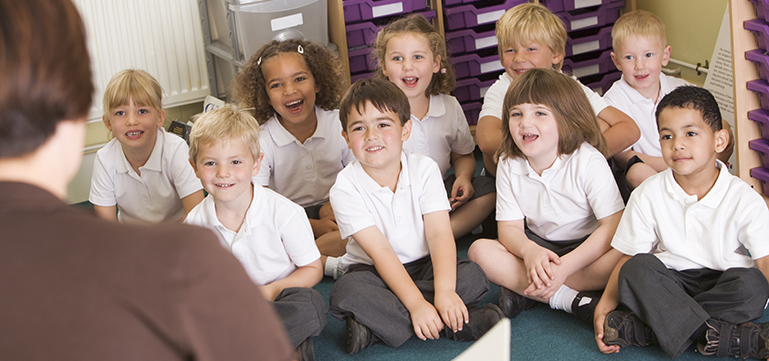Embedding pupil voice into the school ethos

Quick links:
Information about the school
Ynysowen Community Primary School is in Aberfan, in Merthyr Tydfil local authority.
There are 275 pupils on roll aged from 3 to 11 years, including 46 who attend the nursery on a full-time basis and 15 who attend two learning resource bases provided by the local authority. The learning resource bases cater for pupils with complex needs and hearing impairment.
On average over the least three years, around 30% of pupils are eligible for free school meals, which is significantly above the national average of 18%. The school identifies about 37% of pupils as having additional learning needs. This is higher than the national average of 21%. Most pupils enter the school with language, numeracy and social skills that are significantly lower than that expected for their age. No pupil speaks Welsh at home.
Context and background to the effective or innovative practice
The school’s strong and sustained ‘TEAM’ (Together Everyone Achieves More) ethos places both collaboration and communication with pupils at the heart of all its processes. These well-embedded principles ensure that all pupils are provided with extensive opportunities to contribute to their own learning, and are actively involved in all aspects of planning for school improvement.
Fundamental to the school’s aims is the belief that pupils should be provided with opportunities to make decisions that will affect both themselves and their peers, allow them to take responsibility, and learn key values that will guide them in the way they lead their lives. The positive relationships within the school community create an ethos of mutual contribution that empowers pupils to take increased ownership of the experiences afforded to them. These relationships promote the value of learning and a desire for pupils to become lifelong learners.
These well-embedded practices have had significant impact on the development of pupils’ social and emotional wellbeing.
Description of nature of strategy or activity
To ensure an inclusive community where all pupils participate, every pupil in key stage 2, as well as most pupils in Year 2, take an active role in supporting and improving the school community as members of various pupil responsibility groups.
The purposeful partnership between staff and pupils that exists within each of the responsibility groups ensures that all pupils’ views are considered, as opposed to just those of the more confident and articulate. All of the responsibility groups provide pupils with extensive opportunities in which to develop their personal, organisation, leadership and communication skills further through rich and meaningful contexts, which enables them to foster lifelong skills.
Pupil responsibility groups are just one aspect of pupil voice at Ynysowen. Ynysowen ensures that pupils are given every possibility to have their say. For example, before embarking on a new topic, there is extensive consultation between teachers and pupils with regard to the theme pupils envisage, the types of activities they would like to undertake in respect of their chosen theme, and how they foresee the enhancement of their classroom environment to reflect the theme. Consequently, teachers plan a comprehensive and progressive programme of learning, and create rich and stimulating classrooms reflective of pupils’ contributions.
In addition, pupils are asked to consider the specific aspects of a theme they felt worked well, and what areas they felt needed improvement at the conclusion of a topic. Across the whole school, pupils contribute imaginatively to their own learning by reflecting on and evaluating weekly activities. Appropriate suggestions for further activities are sought, which subsequently inform future planning.
Pupils in the foundation phase have direct input into their learning experiences provided in areas of enhanced provision. Teachers develop pupils’ ideas effectively and, as a result, provide stimulating and independent activities.
What impact has this work had on provision and learners’ standards?
The strong and sustained practice of ensuring that pupil voice permeates all aspects of work at Ynysowen has had significant impact on pupils’ engagement in learning, and on their social and emotional wellbeing. Pupils are ready to learn in lessons and grasp new skills and ideas quickly. Results of the school’s annual pupil attitudes survey and pupil questionnaires reflects pupils’ attitudes to both school and learning as being exemplary.
Staff and pupils have a highly positive and productive working relationship built on an understanding of mutual partnership and mutual respect. All members of the school community have a voice. As a result, strong relationships continue to flourish and there is increased interest and enthusiasm from pupils about their learning. This contributes well to pupils’ standards and wellbeing.
How have you shared your good practice?
The school’s practice has been widely shared within the local cluster of schools and through staff visiting schools and external providers.